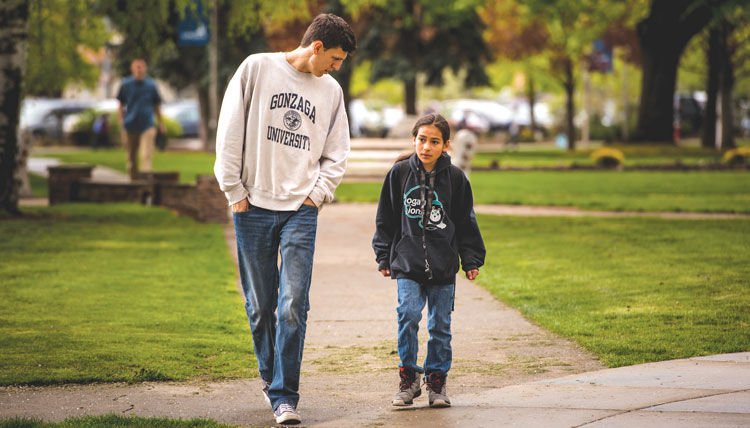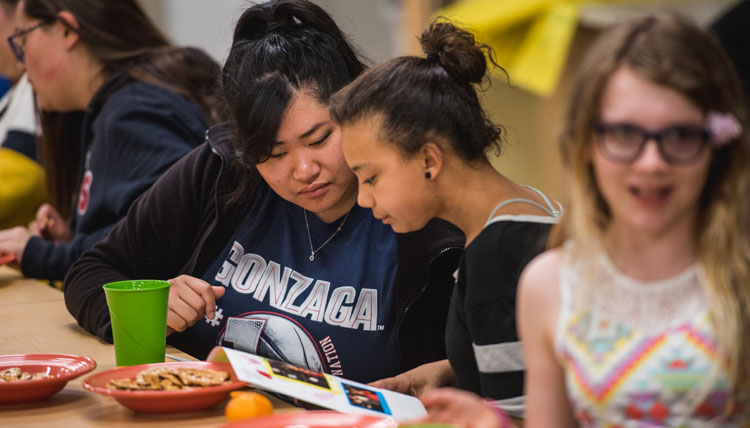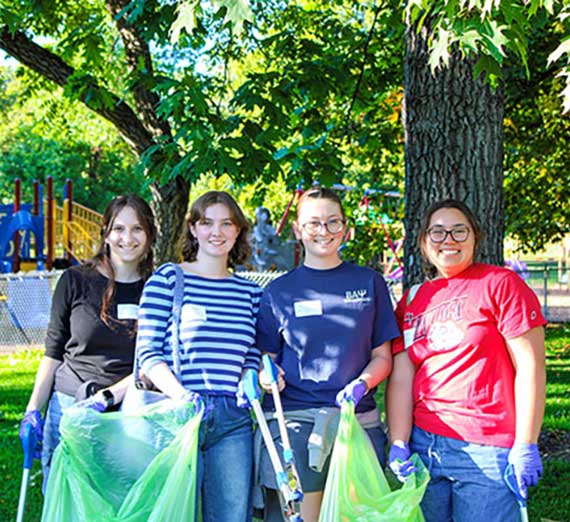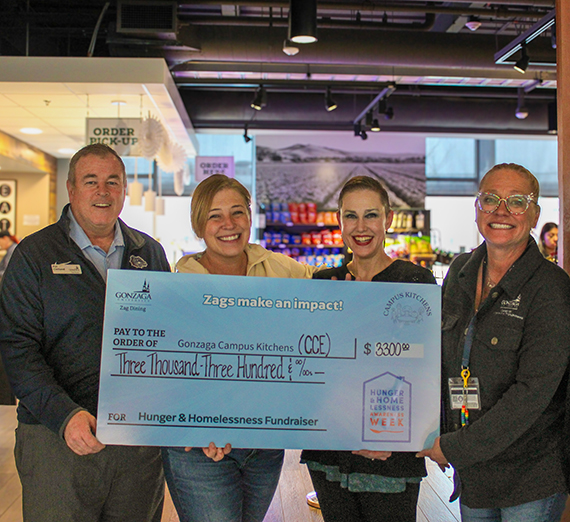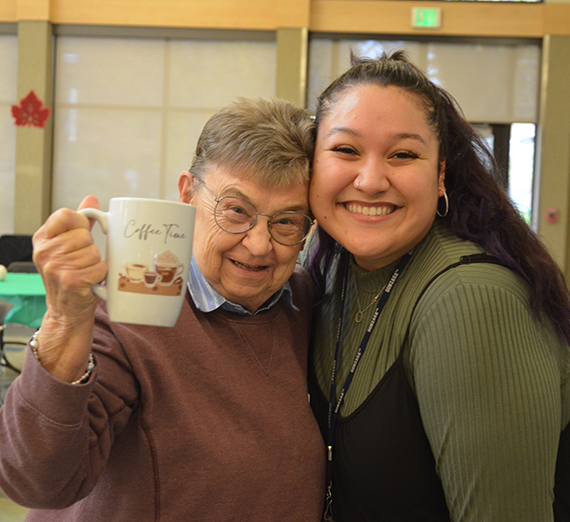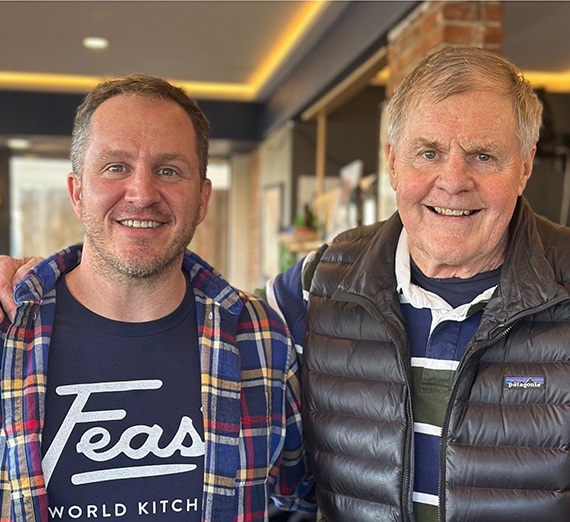Nourishing Our Neighbors
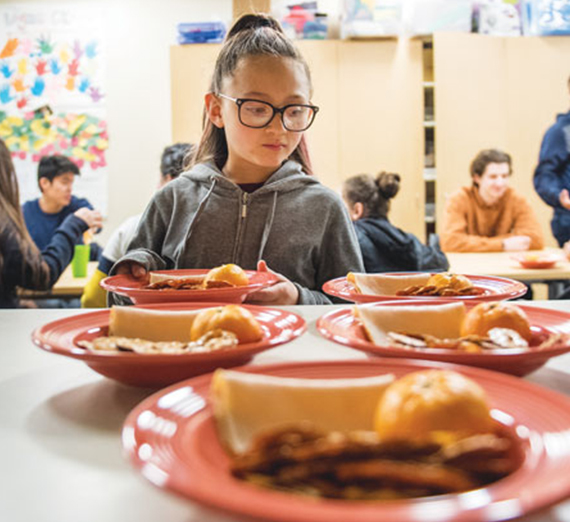
Opportunity Northeast, Gonzaga’s place-based initiative, is strategically focused on improving outcomes for children, youth and families in Northeast Spokane.
When COVID-19 emerged as a serious public health emergency last spring and public schools closed quickly, it didn’t take long for related problems to emerge. While the federal lunch program continued to provide youngsters in grades K-12 with take-away breakfasts and lunches, it was clear that families who accompanied children to claim the meals faced significant food insecurity issues.
“With stay-home orders and pandemic layoffs disproportionately impacting vulnerable populations, there has been a tremendous need in our community to help nourish not just the children, but the adults who care for them as well,” says Brent Perdue, principal of Logan Elementary School.
GU’s Center for Community Engagement was already hosting a weekly evening meal for neighbors. The Logan Family Dinner offered the opportunity for families to gather at the elementary school to build community and share food prepared by GU’s Campus Kitchens. How could the partners leverage this collaboration?
On campus, the collective response quickly included Sodexo Dining Services, which jumped in to support the production and packaging of meals for adults. Campus Kitchens provided coordination, delivery and hands-on support, even without the help of students who typically organize these efforts. The Office of Sustainability, Sodexo and Campus Kitchens redirected the produce grown in their respective gardens. Daily lunches and the weekly evening meal could be provided to adults of students attending Logan Elementary and fresh produce could be shared, too.
Community-based partners broadened the reach, including The Zone Project at Northeast Community Center, Communities In Schools, Second Harvest, Spokane Public Schools, Spokane Regional Health District and World Relief. Additional funding followed, first from an anonymous family, then a grant from Innovia Foundation, as well as grants from the Emergency Food Shelter Program administered by Spokane County United Way on behalf of FEMA, and the Safeway-Albertsons Foundation. This allowed daily lunches to be added at John R. Rogers High School and Stevens Elementary. Partnerships with Second Harvest and Bite2Go extended food distribution at Shaw Middle School and Arlington Elementary. By the end of August, the partners had provided nearly 27,000 meals to local residents.
“What has been most profound for me,” says Molly Ayers, senior director of GU’s Center for Community Engagement (CCE), “is the way we came together quickly and strategically to address the growing food security crisis. Because the University has made a commitment to northeast Spokane, there was instant interest in increasing our support to schools, local organizations and residents.”
“The beauty of it has been the quick and effective collaboration,” Ayers emphasizes. “No convincing necessary – just the ability to direct efforts in a way that has been responsive to community needs.”
A history of engagement and impact
For decades, the University has developed and expanded academic programs as the region has needed professions. Well-established practicums, clinical experiences, internships, and community-based learning opportunities have brought GU students into local schools, hospitals, organizations and businesses, providing support, creativity and talent.
When Campus Kids launched 25 years ago, the youth mentoring program connected Zags with youngsters from Logan and Stevens elementaries for after-school programs and activities. Today, youth enjoy their experiences in several customized spin-offs: Connections (middle school), Sparks (high school), Eye to Eye (for students with learning disabilities), GAME (with athletes), Smile (after-school Express programs), and Zag Study Buddies.
Academic leaders at Gonzaga are expanding on these community-based projects:
- Theatre and Dance students offer after-school dance instruction to nearby elementary students through ZagDance.
- The School of Education and the Center for Community Engagement support middle school students through the Hillyard Youth Collaborative.
- Business and engineering students learn while assisting local companies and organizations.
- Members of the Sociology Department bolster the new Walking School Bus, with Zags accompanying k-6 students from their homes to school.
Individually, these efforts are impactful, but intentional connection with the common goals of Opportunity Northeast can have a deeper and more lasting effect in the community, says Ayers. “Through careful alignment with partners and understanding their priority needs, we can achieve the shared outcomes our neighbors identify.”
Listen, Learn, Innovate
Understanding those community priorities was the heart of Opportunity Northeast’s beginning. Gonzaga faculty and students administered the Mapping Assets and Promoting Strengths (MAPS) study from 2014-15, with input from more than 1,000 residents. In 2019, those priorities were reaffirmed through interviews with an additional 100 community leaders, partner agencies and residents. Neighborhood concerns remained consistent: food security, improved access to health care and educational opportunities, and a desire to build strong, more connected neighborhoods. In addition,concerns about the quality and affordability of housing have increased over the past four years.
With these insights, the Opportunity Northeast Advisory Council has created workgroups to prepare strategic plans and identify measurable outcomes for these primary focus areas:
- Whole health, including access to wellness, health screenings and care; safer and more connected neighborhoods; food security; and increased access to high-quality, affordable housing
- Educational opportunities for both youth and adults, to improve access and outcomes
- Engaged campus and community with opportunities for GU students, faculty and staff to be involved in supporting community leadership development efforts.
Support this vital community-building work with a financial gift in any amount: ReadersCare
Now Underway
Whole Health – In addition to the food security programs outlined above, easy-to-access nutrition and wellness activities and resources are under development to support family-focused health and well-being, courtesy of the School of Nursing and Human Physiology.
Housing – An exciting new partnership with Catholic Charities and nearby Gonzaga Preparatory School will build on existing tutoring and youth mentoring programs to support families at Gonzaga Family Haven. The supportive housing unit, slated for the corner of Hamilton Street and North Foothills Drive, will provide social services to more than 70 low-income families. Construction begins later this year.
Educational opportunities – This summer, Gonzaga students supported recent graduates of Rogers High School in transitioning to postsecondary programs (trade schools, community college or four-year programs). For adults, Gonzaga’s School of Leadership Studies and Career & Professional Development office will partner with The ZONE Project to offer an Essential Skills Pre-Employment series to unemployed/underemployed women in Northeast Spokane. Participants will learn about personal strengths and employment interests, communication, trauma-informed
stress management, resume and cover letter development, interviewing strategies, conflict in the workplace and more.
Engaged campus & community – Volunteer hours provided by GU staff members will connect employees to Opportunity Northeast projects. Six Summer Fellows also joined the effort, adapting programs to meet COVID-19 safety guidelines.
Our Mission-Focused Future
“Opportunity Northeast takes our community engagement efforts to the next level,” says GU President Thayne McCulloh, “beyond ‘good service’ and ‘being helpful’ to a strategic, intentional commitment to work with local residents on the future of our local neighborhoods.”
Consistent with Gonzaga’s mission as a Catholic, Jesuit, humanistic institution, McCulloh says it’s an extraordinarily rich learning opportunity for students to see and understand the realities others are facing. “Students will learn how to build on community strengths to generate the kind of change that neighbors want and value, how to tackle tough, persistent community-based challenges, and how to create improvements that benefit everyone,” he says.
“We are deeply grateful for the private contributions that are powering this new initiative and for the focused attention of faculty and staff who are driving it forward. It is our privilege to work with some of Spokane’s most effective and innovative community partners in this engaging work.”
Learn more: Opportunity Northeast
- Academics
- Service & Community Impact
- Community Action and Service Learning
- Opportunity Northeast
- Gonzaga Magazine

